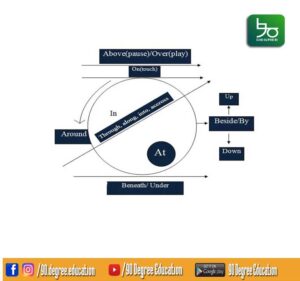ইংরেজি ভাষা জানার দক্ষতা বোঝার মাপকাঠি হিসেবে narration ইংরেজি ব্যাকরণে খুবই গুরুত্বপূর্ণ ভূমিকা পালন করে। ইংরেজি ভাষায় লেখা ও বলার জ্ঞান বৃদ্ধি করতে narration এর গুরুত্ব অপরিসীম। আজকে তাই আমরা চেষ্টা করব narration খুব সহজে আলোচনা করার। Narration কী, কত প্রকার, narration এর বিভিন্ন অংশ ও কীভাবে পরিবর্তন করতে হয় তা নিয়ে বিস্তারিত আলোচনায় চলুন যাওয়া যাক-
Narrate শব্দের অর্থ বর্ণনা করা আর Narration শব্দের অর্থ বর্ণনা। সহজভাবে বলতে গেলে, কারো বক্তব্য বর্ণনা করাকেই এক কথায় Narration বা উক্তি বলা হয়। বক্তা তার বক্তব্য যখন অন্যের নিকট বর্ণনা করে, তখন তাকে Narration বা উক্তি বলে। Narration এর প্রত্যেক বাক্যই Speech বা বক্তব্য।
অর্থাৎ, আমরা বুঝতে পারলাম অন্যের কোনো কথাকে নিজে বলাটাই narration!!
আচ্ছা, তাহলে narration এর প্রকারভেদে যাওয়া যাক-
Kinds of Narration (প্রকারভেদ)
Narration দুই প্রকার।
1. Direct Speech (প্রত্যক্ষ উক্তি)
2. Indirect Speech (পরোক্ষ উক্তি)
Direct speech – বক্তার বক্তব্য হুবহু quotation mark বা উদ্ধৃতি চিহ্নের মধ্যে দিয়ে প্রকাশ করা।
Example:
She said to her friend, “I like chocolate very much.”
এখানে আমাদের মনে রাখতে হবে যে, Direct speech এর মধ্যে দুটি অংশ থাকে
- Reporting Speech
- Reported Speech
Reporting Speech
Reporting speech হল inverted comma-র বাইরের অংশ অর্থাৎ comma-র আগের অংশ। এখানে দুটি অংশ থাকে, বক্তা এবং সে যাকে উদ্দেশ্য করে বলছে।
উপরের উদাহরণে, she said to her friend, হল reporting speech. ‘she’ হলো বক্তা আর ‘her friend’ হলো যাকে উদ্দেশ্য করে বলছে।
Reported Speech
Reported Speech হল inverted comma-র মধ্যেকার অংশ।
উপরের উদাহরণে, “I like chocolate very much.” হলো reported speech।
Indirect Speech
Indirect speech হল বক্তার বক্তব্যের সারাংশ যা অন্য কেউ তার হয়ে ব্যক্ত করে। indirect speech, reported speech নামেও পরিচিত।
Example:
ধরুন উপরের উদাহরণের indirect speech
- She told her friend that she liked chocolate very much.
অর্থাৎ, আমরা চাইলে একটি কথাকে বক্তার মতো করে বলতে পারি। আবার বক্তা যা বলেছে তা নিজের মতো করেও বলতে পারি। তাই আমাদের দুই ধরনই জানতে হবে। আর যেকোনো একটি দেয়া থাকলে তা কীভাবে আরেকটিতে নিয়ে যেতে হয়, তা-ও জানতে হবে। চলুন জেনে আসা যাক-
Changing of Narration
Direct speech থেকে indirect speech এ রূপান্তরিত করতে হলে বেশ কিছু বিষয় পরিবর্তন করতে হয়। যেমন-
1. Reporting Verb এর পরিবর্তন
2. Reported Speech এর Tense পরিবর্তন
3. Inverted Comma (” “) উঠিয়ে দেয়া
4. Reported Speech এর Person পরিবর্তন
5. দূরত্ব সূচক শব্দের পরিবর্তন
Indirect speech or reported speech-এ নিম্নলিখিত বিষয়গুলো লক্ষ্য করা যায়–
- কোন inverted comma ব্যবহার কয়া হয় না। Reporting speech এবং Reported speech একে অপরের সাথে conjunction দ্বারা যুক্ত থাকে। যেমন: ‘if’, ‘that’, or ‘whether’
- Reporting speech এবং reported speech এর মাঝে কোন comma বসে না।
- প্রশ্নবোধক বা বিস্ময়বোধক চিহ্নের পরিবর্তে Full stop ব্যবহৃত হয় ।
- Reporting speech-এ যে tense ব্যবহার করা হয় সেটা আগের মতই থাকবে।
- Interrogative, exclamatory, operative এবং imperative sentence-কে assertive sentence-এ পরিণত করা হয়।
- Reported speech এ যে tense ব্যবহার করা হয় সেটি reporting speech-এর tense-কে অনুসরণ করে।
- Reporting verb, reported speech অনুযায়ী পরিবর্তিত হয়। উপরের উদাহরণে, told একটি reporting verb এবং liked আরেকটি reported verb। Sentence-এর ধরন অনুযায়ী বিভিন্ন ধরনের reporting verb ব্যবহৃত হয়। উদাহারন হিসেবে বলা যায়: asked, offered, promised প্রভৃতি।
- Reported speech-এর pronoun SON নামের একটি নিয়মে পরিবর্তিত হয়, যেখানে, S=Subject, O=Object এবং N=No change। এই নিয়ম অনুযায়ী, first person, reporting verb-এর subject অনুযায়ী পরিবর্তিত হয় । second person, reporting verb-এর object হিসেবে পরিবর্তিত হয় এবং third person-এর ক্ষেত্রে কোন পরিবর্তন হয়না।
- Direct speech-এর adverb গুলো পরিবর্তিত হবে।
আমাদেরকে আসলে ঠিক নিয়মে Narration করতে হলে জানতে হবে-
1. Sentence চেনার উপায় ।
2. Sentence এর পরিবর্তন ।
3. Person এর পরিবর্তন ।
4. Verb এর পরিবর্তন ।
চলুন তাহলে ধাপে ধাপে এগুলো নিয়ে জানা যাক-
***1. Sentence চেনার উপায় ।
1. Assertive: Subject প্রথমে থাকলে ।
যেমন: Khalid is my son.
2. Interrogative: Wh Question + Auxiliary Verb অথবা Auxiliary Verb প্রথমে থাকলে । শেষে?
যেমন: Where are you living? Are you sleeping?
3. Imperative: Present Form, Don’t / Never + Present Form, Please, Kindly, Let প্রথমে থাকলে ।
যেমন: Watch it. Don’t go there. Please come in.
4. Optative : May প্রথমে থাকলে । শেষে Full Stop.
যেমন: May you go there.
5. Exclamatory: what a / an, How + adjective, Hurrah, Alas ইত্যাদি থাকলে । শেষে!
যেমন: What an intelligent girl you are!
Said to—–Comma
1. Assertive: told —– that
2. Interrogative: asked—- if/wh question
3. Imperative: present form হলে
Ordered —to
Don’t/ never হলে prohibited— not to
Please / kindly হলে requested—to
উপদেশ হলে advised —to
Let থাকলে proposed to—that (might)
4. Optative: wished / prayed — that
5. Exclamatory: exclaimed with joy—that
Exclaimed with sorrow—that
*** 3. Person এর পরিবর্তন ।
First Person – Reporting Verb এর Subject অনুযায়ী
Second Person- Reporting Verb এর Object অনুযায়ী
Third Person- Reporting verb এর subject অনুযায়ী
***4. Verb এর পরিবর্তন ।
Reported speech যদি-
1. Present indefinite to past indefinite
2. Present continuous to past continuous
3. Present perfect to past perfect
4. Past indefinite to past perfect
5. Past continuous to past perfect continuous
6. Past perfect to no change
7. Universal truth /habitual fact to tense এর no change
8. Reporting verb যদি present /future tense হয় তাহলে reported speech এর tense এর কোনো change হবেনা।
Direct Speech থেকে Indirect Speech করার প্রাথমিক নিয়মাবলী
Rule-1: যেকোনো Sentence কে Direct থেকে Indirect করা হলে তার Inverted comma (” “) উঠে যায় এবং Sentence টি Assertive হয়ে থাকে।
উদাহারন হিসেবে বলা যায়-
Direct: He said, “I am eating pasta.”
Indirect: He said that he was eating pasta.
Note: – Reporting Verb এর Verb দেখে বুঝতে হবে কোন Tense ব্যবহার করা হয়েছে। উপরের sentence এ যখন বলা হলো Said, এখানে বুঝতে হবে এটা অতীতের কথা। সুতরাং Eating Pasta টা অতীতে হয়েছে, তাই এর Indirect করে বলার সময় অতীতের কথা টা উল্লেখ থাকার জন্য Is টা Was তথা Past Tense হয়ে যাবে।
Direct: Father said to me, “May you be happy.”
Indirect: Father wished that I might be happy.
Rule-2: Reported Speech টিকে Reporting Verb এর সাথে সাধারণত if, that বা whether, to ইত্যাদি দ্বারা যুক্ত করতে হবে
উদাহারন হিসেবে বলা যায়-
Direct: He said, “I like fruits.”
Indirect: He said that he liked fruits.
Direct: Mina said to me, “Are you ill.”
Indirect: Mina asked me if I was ill.
Rule-3: Reporting Verb Present অথবা Future Tense এ হলে Reported Speech এর Tense এর কোন পরিবর্তন হয় না।
উদাহারন হিসেবে বলা যায়-
Direct: He says, “I am sick.”
Indirect: He says that he is sick.
Direct: Tania will say, “I write a poem.”
Indirect: Tania will say that she writes a poem.
Note: – Indirect Speech এ সবসময় Assertive Sentence ব্যবহার হবে।
আশা করি, narration নিয়ে আপনাদের বেসিক ঠিক হয়েছে এবং narration এর খুঁটিনাটি অনেক কিছু আপনারা জানতে পেরেছেন। পরবর্তীতে আরও অনেক অনেক রুলস নিয়ে আলোচনা হবে। ততদিন আমাদের সাথেই থাকুন।


